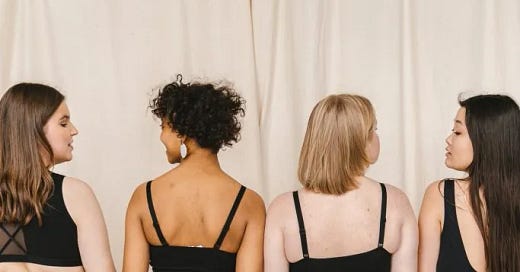Naked’s a practice. ~Emily Morse, Sex with Emily podcast
When Shayna was very small, she and her sisters learned to close the door when they went to the restroom, make sure to wipe their hooha, flush, and then wash their hands when they were done. It wasn’t until she was in 5th grade, when the kids were divided up binarily to learn about puberty in two different rooms, that she heard the words “vagina” and “vulva” for the first time. After a decade of “hooha,” you can imagine how long it took to get used to thinking of that part of her body by different names.
Most of our parents were/are pretty uncomfortable with sex. Some, so much so that they couldn’t bring themselves to utter the true names of the body parts involved in intercourse. Shayna’s parents didn’t call her elbows something cute. There were no alternative names for her neck. Just the reproductive parts. Those were awkward to talk about for her mom and dad, so they used different words in order to feel more comfortable. Over time, Shayna learned that talking about sex, and by proxy, parts of her body, was awkward. And not appropriate.
Children don’t innately have any problem with their bodies. Children are fine being naked, fine touching all the different parts of themselves. Little by little, the use of “hooha” and “weiner” and “peepee” and “coochie” teaches kids that parts of the body are foreign or funny or not normal like elbows and knees.
If one of the reasons you are reading the Body Acceptance Project is that it is hard for you to look in the mirror when you are naked, what were you taught about being naked as a child? What didn’t your caregivers say to you? What did they call your body parts?
Were your caregivers comfortable talking about their bodies? If so or if not, how did you know?
“I often say to parents as a fellow parent and a fellow grandparent, look, it’s sometimes hard to talk about these names and use them, if when you were a child they were not spoken to you, but if you take a deep breath and just plunge in, these are the right things for kids to know, that these are parts of their body they can be proud of and it’s O.K. to say these words.’” ~children’s author Robie Harris
Healing this disconnection that was handed to us by parents who were uncomfortable with their own bodies and/or what your body had the potential to do is not a small endeavor. Nurturing our body helps us feel better - both by reducing overall stress, and in the long-term connecting us more intimately with our bodies. If you’ve never massaged your own feet, add it to your Healing To-Do List. If this feels too intimidating, take an extra 30 seconds next time you apply lotion or or scrub in the shower to notice how it feels as you make connection with your body. Pay attention to the parts you are touching and see if you can learn something new about the way our body looks, feels or functions as you do it.
Smalls steps- why not try?






